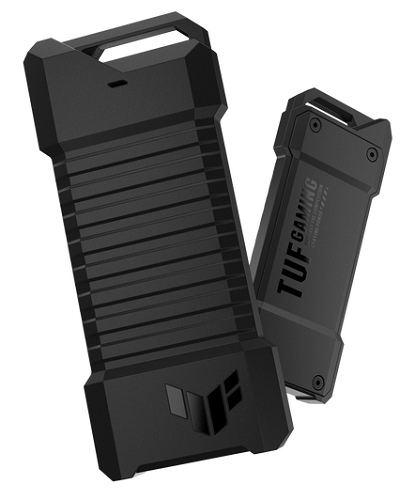ASUS today announced the TUF Gaming AS1000, a portable high-performance M.2 NVMe 1 TB SSD with innovative cooling features to ensure ultrafast data transfers. TUF Gaming AS1000 uses a USB-C 3.2 Gen 2x1 connection and is compatible with PCs, laptops, and the latest gaming consoles. This SSD has been subjected to stringent durability testing to ensure stored data is well-protected from everyday spills and knocks. Plus, bundled NTI Backup Now EZ software (valued at up to US$35.99) allows for easy data backup and recovery.

Military-grade toughness
The TUF Gaming AS1000 has been subjected to a rigorous battery of durability tests, including the U.S-military-grade MIL-STD-810H drop test and IP68 water-and-dust-resistance tests. Devices were dropped from various heights, submerged in water, and exposed to dust and dirt to ensure toughness, making the TUF Gaming AS1000 more than capable of withstanding accidental bumps, knocks, and spills.
Ultrafast transfer speeds and ample storage
The TUF Gaming AS1000 features blazing-fast M.2 NVMe® PCIe® SSD sequential read/write speeds of up to 10 Gbps — up to 10X faster than conventional external HDDs — and up to 1 TB of storage. It is perfect for those looking to expand storage capacity, as well as for those who want ultrafast data performance for on-the-go gaming, backing up large files, or creating 4K content. An aluminum-alloy chassis and internal thermal pad effectively dissipate heat to enable stable data transmission and prolong the lifespan of the SSD.
Convenient user-friendly features
The TUF Gaming AS1000 uses a single USB-C connection and is compatible with mobile devices, laptops, PCs, as well as the latest PlayStation® and Xbox gaming consoles. The intuitive SSD Dashboard built-in software lets users effortlessly monitor vital information such as SSD temperature, storage status, and more. Plus, bundled NTI Backup Now EZ software valued at up to US$35.99 protects precious digital assets from malicious attacks or hardware failures. In addition, a data recovery feature helps in instances when a file is accidentally deleted.

